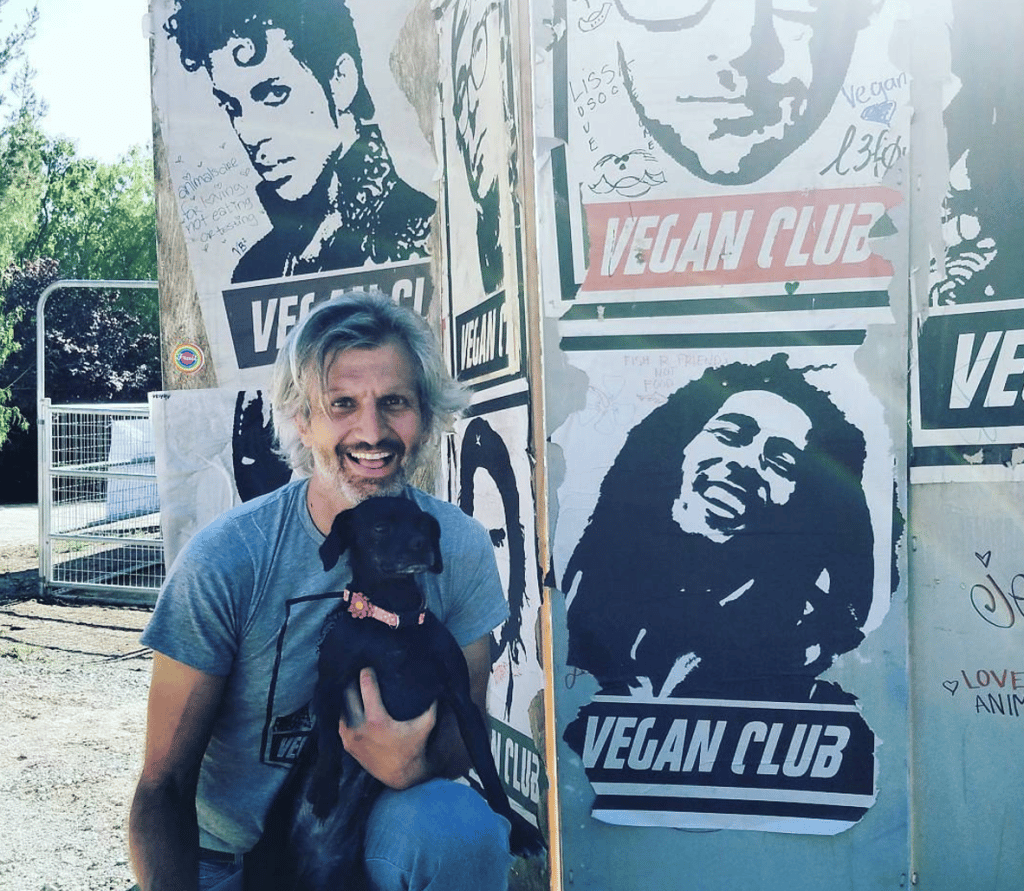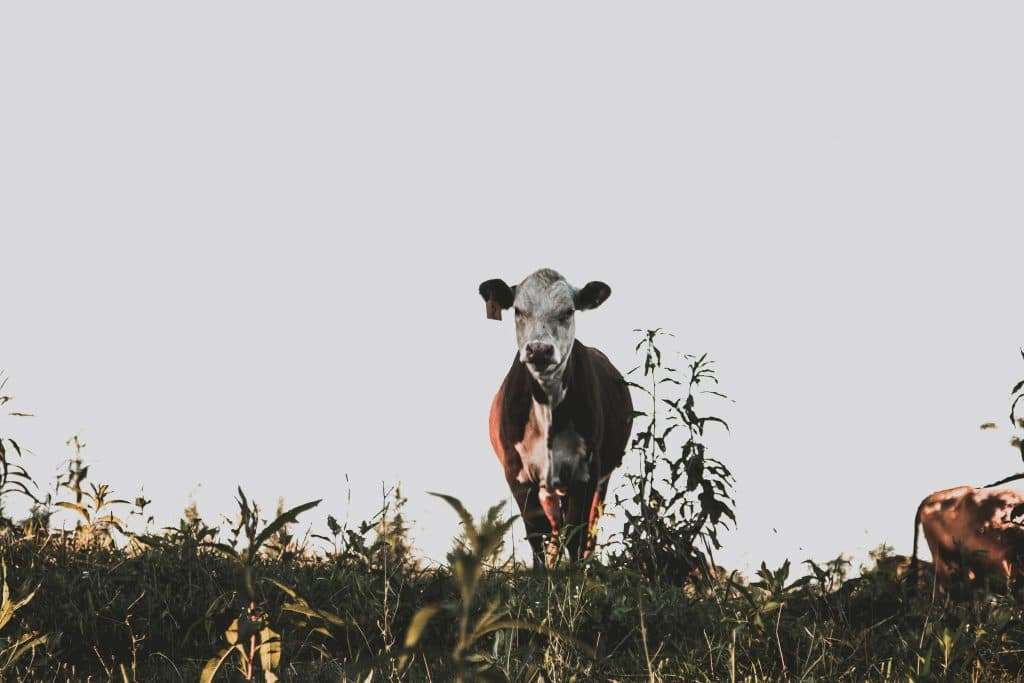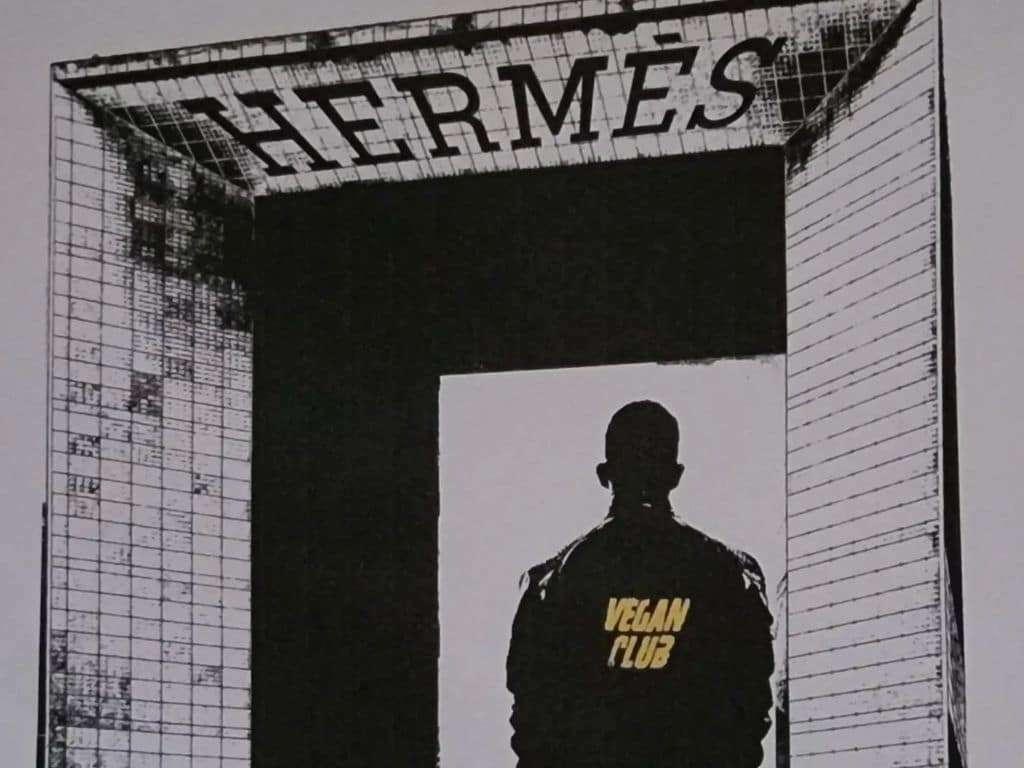The man behind the abundance of Los Angeles vegan street art, Constantin Le Fou makes it clear: his Vegan Club is for everyone.
The first vegan street art I remember seeing was the “eating animals” sticker plastered onto stop signs around my Pennsylvania hometown (as in “Stop Eating Animals”) more than two decades ago. It was a welcome sight at a time when not eating animals seemed as foreign as eating buffalo cauliflower ‘wings.’ Times have indeed changed.
Fast-forward to today, and Los Angeles, my current home, is like the Louvre for street art. It’s also the epicenter of vegan food and culture. And more than ever, they‘re overlapping in prodigal brilliance. The reigning artist in residence? It’s Constantin Le Fou, a tall, greying European transplant whose iconic Vegan Club artwork has become more than merely an addition to LA’s legendary graffiti scene. It’s becoming the visual voice of the vegan movement.

Le Fou grew up in Greece and France before making his way to Los Angeles back in 1993 in his early 20s. While always an artist, sketching and drawing in school, he chose to study economics instead of entering France’s School of Fine Art (the Beaux Arts).
But his passion for art never left him. He made music for a spell (his living room is still packed with instruments and recording equipment), but it would be art that finally regained a stronghold on Le Fou, especially once he went vegan.
Going vegan
Like many ethical vegans, Le Fou has a powerful story that pushed him to make the lifestyle shift.
“I was stuck in a bad traffic jam coming from Las Vegas,” he tells me as we sit surrounded by his artwork and three rescue dogs in his Downtown LA studio. “I was stuck next to a truck carrying pigs [to slaughter].”
Traffic was at a standstill for a while, and with two dogs in the backseat, Le Fou turned off the engine, rolled down the windows, and waited for traffic to start moving. A few minutes later, though, his dogs were panting excessively in the desert heat. And as he turned the car back on and began to roll up the windows to contain the cool air-conditioning, he noticed the pigs in the truck—with no cool air or water to drink—but just as stranded as him and his dogs.
“It was profound,” he says.
Following that event, he’d pivot his dogs away from pig products. “It didn’t seem right that they should eat an animal who’s smarter than they are,” he said. Pigs are incredibly intelligent animals—and they are indeed smarter than dogs, yet nearly 115 million are killed each year for food—three times the number of cows. But Le Fou himself was still eating meat. A few weeks later he’d realize the hypocrisy and gave it up completely. That was 2001.
“I had already quit smoking and knew if I could give that up, I can do anything [like quitting meat],” he said.
Like many vegetarians, Le Fou would evolve his thinking and come to recognize that consuming any animal products—especially dairy—didn’t make sense. “These cows suffer so much more than an animal who’s slaughtered,” he says of the modern dairy industry, as he discusses the pain dairy cows experience being constantly tethered to milking machines and being repeatedly impregnated (typically by artificial insemination) so they’re able to keep producing milk, which, like humans, is made for their offspring.
At the same time, Le Fou was adapting his diet; the fan of film and pop art since childhood was also connecting with the overtly political and social street art of Banksy, as well as local LA artist Shepard Fairy, particularly his popular “Obey” work, which features the likeness of the late wrestler and actor Andre Roussimoff, best known as Andre the Giant.
Vegan Club
Then, a few years ago, Le Fou heard that Fight Club star Brad Pitt was vegan (he is not anymore), and the idea for using the “Fight Club” logo to call out vegan celebrities was born.
From there, Le Fou began collaborating with his vegan celebrity muses to use their likeness—musician, author, restaurateur, and activist Moby; No Doubt’s bassist Tony Kanal; tattoo artist, reality star, and founder of then eponymous vegan make-up line, Kat Von D, appear frequently in his work. He’d use other well-known vegan celebs too like the late River Phoenix, Prince, and even Gandhi (who, while not vegan, was a strict pacifist and would likely have abstained from industrial animal products were he alive today).
“I’m very much for open-source,” Le Fou says of his artwork. “I don’t like limitations.” He views the inclusion of other artists and styles like a musician might sample a hook from another artist, saying it’s both a sign of respect and helps to elevate everyone’s efforts. And he gets permission from the celebrities who he says are often flattered by his work. Like pop artist Andy Warhol, the goal is to elevate the simplicity and repetition into the iconic. And it seems to be working; his fans are certainly in agreement, posting selfies in Vegan Club shirts in front of Vegan Club street art on the daily.
In 2017, Le Fou used the Vegan Club platform (which now includes customizable t-shirts among other items) to highlight the Netflix film Okja, directed by Bong Joon-ho. The feature follows the story of a genetically modified “superpig” and her human companion on a journey through the industrial animal complex, and it’s become a hugely important film to the animal rights movement.
“The cruelty Okja depicts is super-close to real life,” PETA writes on its blog. “Yes, the film got us all weeping because we imagined our own beloved animal friends in Okja’s position, and we would never want anyone to kidnap, torture, rape, chop up, and eat them. But the images of cruelty and heartache portrayed in the film are a reality for the billions of animals who are killed for food every year.”
Le Fou says his next line of Vegan Club designs will feature some iconic activists who’ve played significant roles in furthering the movement (think Ingrid Newkirk of PETA or Paul Watson of Sea Shepherd).
Recent estimates put vegans at just six percent of the U.S. population. And as “plant-based” eating—like flexitarian dieters who may observe Meatless Monday or VB6 (Mark Bittman’s vegan before 6 pm)—is now the norm for millions of omnivores, the ethics of veganism are not often their first consideration. For many it’s health or the environment.
Add to that the uptick in labeling claims like “natural”, “cage-free”, and “free-range,” and consumers are being led to believe their animal products are more ethical than ever. But those marketing tricks are traps, for the conscious consumer, certainly, but they’re even more detrimental for the animals who often see no significant welfare benefits. They may eat a slightly cleaner diet or there may be the addition of a door to the massive metal house they live in, for “free-range” access, but it’s hardly the equivalent of life in an animal sanctuary.
But art, like Le Fou’s Vegan Club, or anonymous efforts like Misteruncertain (best known for “Not Your Mom, Not Your Milk”), and the Vegan Mattress Squad, are helping to redirect the message back to the ever-important ethical discussion.
A love for carrots or tofu isn’t enough to keep flexitarians moving toward veganism; they need to have a profound reckoning—perhaps like Le Fou did somewhere outside of Barstow next to that truckload of pigs. They need to come to terms with the fact that animals are sentient beings, are deserving of our respect, and have every right not to be tortured, be it for food, clothes, deodorant, or entertainment.
Le Fou says that as a child he experienced physical abuse, which has helped him better understand what animals go through.
“It’s not the beating that’s the hard part,” he says with a wince, “it’s living in constant fear of when the next one is going to happen.” This, he says, is what animals in our current state of livestock production endure every day.
Modern animal farms
A 2017 exposé by animal rights group Mercy for Animals captured the first-ever publicly-released drone footage of egg-laying hen factory farms in three states. There’s nothing “farm” about these industrialized operations, though. And they’re certainly not unique—this is the norm for most animals raised for food in the U.S., and increasingly around the world: giant metal sheds—some ten in a row—with no windows, no air circulation, no light. Instead, the birds are stacked inside the space of an iPad, which isn’t even large enough for them to spread a wing.
Outside, there are giant manure lagoons, filled with the noxious waste of tens of thousands of animals not only making it hard for the birds to breathe, but the residents of nearby communities suffer as well. A representative for Mercy for Animals told me one of the “farms” may have as many as one million birds on site.

At a time when the vegan diet is finally getting the credit it deserves as delicious, nutritious, better for the planet, and certainly better for the animals, there’s still a whole lot of work to be done. Artists like Le Fou are playing a critical role in moving things forward by openly having that discussion.
Not limited by rules that apply to making health claims, or the industry backlash a brand may face in promoting the horrors of factory farming, artists are in a unique and truly powerful position protected by the First Amendment to say whatever they want. For an artist like Le Fou, it’s more than liberating. It’s a freedom that comes with a huge responsibility.
“If animals could speak to us, they would say we are the devil,” Le Fou says, paraphrasing a quote by author William Inge. And the time to change that, he says, is now—not just for the animals, but also for the planet, and the people who will benefit in myriad ways from a shift away from eating animals.
Art is the medium and the message to make it happen, Le Fou says. “It’s a crime right now to have talent and not use it for this.”
Everyone looks good in a Vegan Club t-shirt. Get yours here.
This article originally appeared on EcoSalon.


